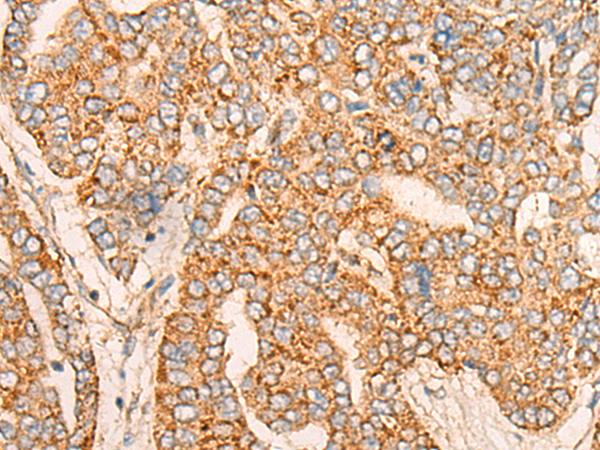
| WB | 咨询技术 | Human,Mouse,Rat |
| IF | 咨询技术 | Human,Mouse,Rat |
| IHC | 1/25-1/100 | Human,Mouse,Rat |
| ICC | 技术咨询 | Human,Mouse,Rat |
| FCM | 咨询技术 | Human,Mouse,Rat |
| Elisa | 1/5000-1/10000 | Human,Mouse,Rat |
| Aliases | TL2; APO2L; CD253; TRAIL; Apo-2L; TNLG6A |
| Host/Isotype | Rabbit IgG |
| Antibody Type | Primary antibody |
| Storage | Store at 4°C short term. Aliquot and store at -20°C long term. Avoid freeze/thaw cycles. |
| Species Reactivity | Human |
| Immunogen | Fusion protein of human TNFSF10 |
| Formulation | Purified antibody in PBS with 0.05% sodium azide and 50% glycerol. |
+ +
以下是关于TNFSF10(TRAIL)抗体的3篇代表性文献,简要整理如下:
---
1. **文献名称**:*Targeting TNFSF10 in cancer: A promising therapeutic approach*
**作者**:Ashkenazi A, et al.
**摘要**:该研究探讨了抗TNFSF10/TRAIL受体单克隆抗体在癌症治疗中的应用,证明其通过选择性激活肿瘤细胞凋亡通路抑制肿瘤生长,同时对正常细胞毒性较低,具有潜在临床价值。
---
2. **文献名称**:*Combination therapy with anti-TRAIL receptor antibodies enhances antitumor immunity*
**作者**:Lemke J, et al.
**摘要**:作者发现TNFSF10抗体与免疫检查点抑制剂(如抗PD-1)联用可显著增强T细胞介导的抗肿瘤免疫反应,为实体瘤联合治疗策略提供了实验依据。
---
3. **文献名称**:*The role of soluble TRAIL in resistance to antibody-based cancer therapy*
**作者**:Zhang L, et al.
**摘要**:该文献揭示了肿瘤微环境中可溶性TRAIL蛋白的存在可能削弱抗TNFSF10抗体的治疗效果,并提出通过靶向肿瘤基质微环境优化抗体疗效的潜在方案。
---
如需具体文献来源或补充更多内容,可进一步说明研究方向(如基础机制、特定癌症类型等)。
TNFSF10. also known as tumor necrosis factor-related apoptosis-inducing ligand (TRAIL), is a member of the TNF superfamily that plays a critical role in regulating apoptosis through interaction with death receptors DR4 (TRAIL-R1) and DR5 (TRAIL-R2). These receptors trigger extrinsic apoptotic pathways upon ligand binding, making TNFSF10 a key mediator of immune surveillance against tumor cells and infected cells. However, many cancers develop resistance to TRAIL-induced apoptosis by upregulating decoy receptors (DcR1/DcR2) or anti-apoptotic proteins.
TNFSF10 antibodies are tools designed to either mimic or modulate TRAIL activity. Agonistic antibodies targeting DR4/DR5 (e.g., mapatumumab, lexatumumab) aim to induce apoptosis in cancer cells by clustering death receptors, showing potential in preclinical and clinical oncology studies. Conversely, inhibitory antibodies blocking TNFSF10 or its receptors may help manage autoimmune or inflammatory conditions where excessive apoptosis occurs. These antibodies are widely used in research to study TRAIL signaling dynamics, cancer resistance mechanisms, and therapeutic targeting strategies.
Despite promising early results, clinical translation faces challenges like tumor selectivity, systemic toxicity, and variable patient responses. Current research focuses on antibody engineering (e.g., Fc modifications), combination therapies with chemotherapeutic agents, and biomarkers for patient stratification. Commercially available TNFSF10 antibodies also serve as essential reagents for immunohistochemistry, flow cytometry, and Western blotting in basic research.
×